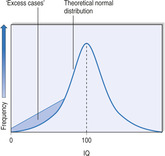Those with this condition are also known variously as people with learning disability (or disabilities), people with learning difficulties or, particularly in the past in the UK, as having a mental handicap.
CLASSIFICATION
The intelligence quotient is calculated from the following formula:


On the basis of IQ, ICD-10 classifies mental retardation into the groups shown in Table 12.1.
| Degree of mental retardation | IQ range |
|---|---|
| Mild | 50–69 (inclusive) |
| Moderate | 35–49 (inclusive) |
| Severe | 20–34 (inclusive) |
| Profound | Under 20 |
PREVALENCE
The overall prevalence of mental retardation is around 2%. Table 12.2 shows the prevalence of each type and Table 12.3 shows the proportion.
| Degree of mental retardation | Prevalence (%) |
|---|---|
| Mild | 1.5 |
| Moderate and severe | 0.5 |
| Profound | 0.05 |
| Degree of mental retardation | Proportion of all cases of mental retardation (%) |
|---|---|
| Mild | 75 |
| Moderate | 20 |
| Severe | 5 |
| Profound | <1 |
Although IQ is standardized to follow a normal distribution, with mean 100 and standard deviation 15, the actual frequency distribution of IQ in the population is skewed in the way shown in Figure 12.1. The ‘excess cases’ with low IQ (over and above those expected on the grounds of probability to fall into that range of intelligence quotients) contain subjects with genetic and chromosomal abnormalities.
 |
| Figure 12.1 (With permission from Puri BK, Laking PJ, Treasaden IH 2002 Textbook of psychiatry. Churchill Livingstone, Edinburgh.) |
MILD MENTAL RETARDATION
Self-care and living skills
Most achieve full independence in self-care (eating, washing, dressing, bladder and bowel control). They may marry and hold down a job.
Language and communication skills
Most can use speech for normal circumstances and can hold conversations.
Education
Many have difficulties with reading and writing, but they can benefit from special education that aims to develop their skills.
MODERATE MENTAL RETARDATION
Self-care and living skills
Achievement of self-care and motor skills is retarded, but individuals are often able to attain considerable independence in daily living with some supervision. Some adults can carry out simple practical work.
Language and communication skills
The development of comprehension and use of language is slow and the eventual attainment limited. However, individuals are usually able to communicate adequately.








